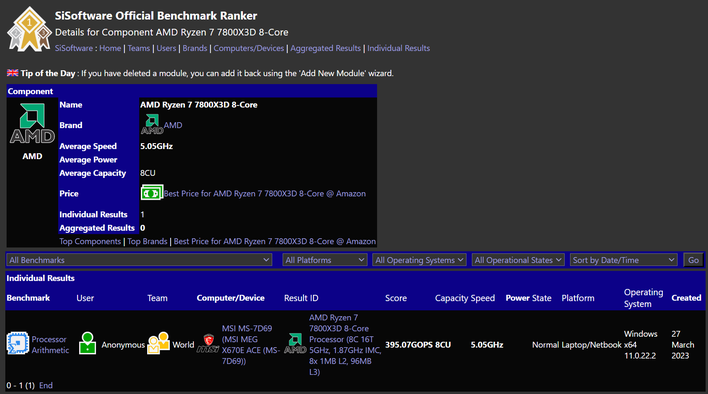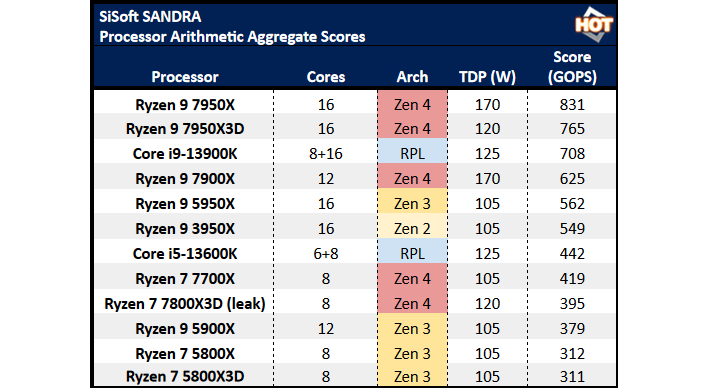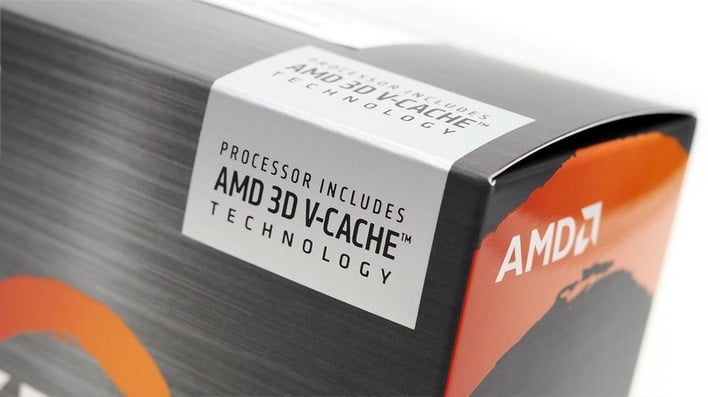AMD Ryzen 7 7800X3D Slaughters 5800X3D In Early Benchmark Showdown
Can you believe that the Ryzen 9 7900X3D and Ryzen 9 7950X3D have already been out a month? Yes, indeed—the launch date for the eight-core Ryzen 7 7800X3D, arguably the most exciting member of its family, is just nine days away now. What seemed like an eternity last month now seems all too soon, although we suppose it's just in time for tax returns.

Leak located by way of 188号 on Twitter.
You should really wait for reviewers to release independent tests, but if you're chomping at the bit for benchmark data, we've already got our first leak of a benchmark on the eight-core Zen 4-X3D CPU. You can take a look, but it's unfortunately not a particularly interesting test for an X3D CPU: SiSoftware's Sandra Processor Arithmetic test, which measures pure CPU compute throughput in terms of operations/second.
This test has little correlation to typical client workloads, such as web browsing or gaming. That's in part because it uses an extremely small amount of memory, and will usually fit in the CPU cache of modern processors—even those without 3D V-Cache—and also because it is an "embarrassingly-parallel" test. In other words, it will pretty much scale out to however many processors you want to throw at it. This test wants clocks and cores above all else.
That's why older chips like the Ryzen Threadripper 3990X and Xeon W-3175X still dominate the "Desktop" class in this test—because of their extremely high core counts. That's not to say newer CPUs with higher IPC and clocks don't perform better relative to core count, though. Of particular note here are the 12-core Ryzen 9 7900X beating its 16-core predecessors, and the eight-core Zen 4 processors beating the 12-core Ryzen 9 5900X.

Looking at the leaked result for the Ryzen 7 7800X3D, it comes in a bit behind the Ryzen 7 7700X. That shouldn't really be a surprise to anyone who knows the specifications of these two processors as well as the qualities of this benchmark that we've just explained. The 3D V-Cache version of AMD's eight-core Zen 4 CPU drops a small but significant chunk of peak boost clock to maintain the integrity of its extra cache die; Sandra reports the "average speed" of the 7700X to be 5.55 GHz, while the 7800X3D result lists 5.05 GHz for the same statistic.
So, what does this tell us about the performance of the 7800X3D? Well, very little, unfortunately. As mentioned above, this test really doesn't correlate to client workloads at all and is mostly of academic curiosity aside from folks running a select few very specific scientific workloads. Hopefully we get some juicier leaks soon, but really, the April 6th release date's just nine days away. We reckon we can hold on until then.


